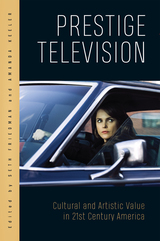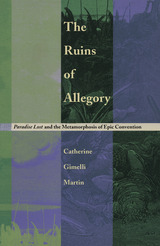2 books by Martin, Catherine

Prestige Television
Cultural and Artistic Value in Twenty-First-Century America
Seth Friedman
Rutgers University Press, 2023
Prestige Television explores how a growing array of 21st century US programming is produced and received in ways that elevate select series above the competition in a saturated market. Contributing authors demonstrate that these shows are positioned and understood as comprising an increasingly recognizable genre characterized by familiar markers of distinction. In contrast to most accounts of elite categorizations of contemporary US television programming that center on HBO and its primary streaming rivals, these essays examine how efforts to imbue series with prestigious or elevated status now permeate the rest of the medium, including network as well as basic and undervalued premium cable channels. Case study chapters focusing on diverse series, ranging from widely recognized examples such as The Americans (2013-2018) and The Knick (2014-15) to contested examples like Queen of the South (2016-2021) and How I Met Your Mother (2005-2014), highlight how contributing authors extend conceptions of the genre beyond expected parameters.
[more]

The Ruins of Allegory
Paradise Lost and the Metamorphosis of Epic Convention
Catherine Gimelli Martin
Duke University Press, 1998
In this reexamination of the allegorical dimensions of Paradise Lost, Catherine Martin presents Milton’s poem as a prophecy foretelling the end of one culture and its replacement by another. She argues that rather than merely extending the allegorical tradition as defined by Augustine, Dante, and Spenser, Milton has written a meta-allegory that stages a confrontation with an allegorical formalism that is either dead or no longer philosophically viable. By both critiquing and recasting the traditional form, Milton describes the transition to a new epoch that promises the possibility of human redemption in history.
Martin shows how Paradise Lost, written at the threshold of the enormous imaginative shift that accompanied the Protestant, scientific, and political revolutions of the seventeenth century, conforms to a prophetic baroque model of allegory similar to that outlined by Walter Benjamin. As she demonstrates, Milton’s experimentation with baroque forms radically reformulates classical epic, medieval romance, and Spenserian allegory to allow for both a naturalistic, empirically responsible understanding of the universe and for an infinite and incomprehensible God. In this way, the resulting poetic world of Paradise Lost is like Milton’s God, an allegorical “ruin” in which the divine is preserved but at the price of a loss of certainty. Also, as Martin suggests, the poem affirmatively anticipates modernity by placing the chief hope of human progress in the fully self-authored subject.
Maintaining a dialogue with a critical tradition that extends from Johnson and Coleridge to the best contemporary Milton scholarship, Martin sets Paradise Lost in both the early modern and the postmodern worlds. Ruins of Allegory will greatly interest all Milton scholars, as well as students of literary criticism and early modern studies.
Martin shows how Paradise Lost, written at the threshold of the enormous imaginative shift that accompanied the Protestant, scientific, and political revolutions of the seventeenth century, conforms to a prophetic baroque model of allegory similar to that outlined by Walter Benjamin. As she demonstrates, Milton’s experimentation with baroque forms radically reformulates classical epic, medieval romance, and Spenserian allegory to allow for both a naturalistic, empirically responsible understanding of the universe and for an infinite and incomprehensible God. In this way, the resulting poetic world of Paradise Lost is like Milton’s God, an allegorical “ruin” in which the divine is preserved but at the price of a loss of certainty. Also, as Martin suggests, the poem affirmatively anticipates modernity by placing the chief hope of human progress in the fully self-authored subject.
Maintaining a dialogue with a critical tradition that extends from Johnson and Coleridge to the best contemporary Milton scholarship, Martin sets Paradise Lost in both the early modern and the postmodern worlds. Ruins of Allegory will greatly interest all Milton scholars, as well as students of literary criticism and early modern studies.
[more]
READERS
Browse our collection.
PUBLISHERS
See BiblioVault's publisher services.
STUDENT SERVICES
Files for college accessibility offices.
UChicago Accessibility Resources
home | accessibility | search | about | contact us
BiblioVault ® 2001 - 2024
The University of Chicago Press









